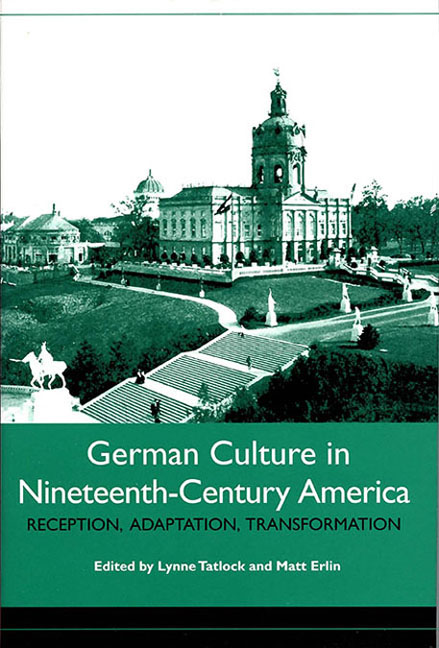Book contents
- Frontmatter
- Contents
- List of Illustrations
- Acknowledgments
- Introduction
- 1 Cultural Politics at the Turn of the Twentieth Century
- Cultural History: An American Refuge for a German Idea
- The Image of Culture — Or, What Münsterberg Saw in the Movies
- Tacitus Redivivus or Taking Stock: A. B. Faust's Assessment of the German Element in America
- The St. Louis World's Fair of 1904 as a Site of Cultural Transfer: German and German-American Participation
- 2 In Pursuit of Intellectual Culture
- 3 Translation American Style
- 4 Immigration and Naturalization Acts
- Contributors
- Index
Cultural History: An American Refuge for a German Idea
from 1 - Cultural Politics at the Turn of the Twentieth Century
Published online by Cambridge University Press: 13 April 2017
- Frontmatter
- Contents
- List of Illustrations
- Acknowledgments
- Introduction
- 1 Cultural Politics at the Turn of the Twentieth Century
- Cultural History: An American Refuge for a German Idea
- The Image of Culture — Or, What Münsterberg Saw in the Movies
- Tacitus Redivivus or Taking Stock: A. B. Faust's Assessment of the German Element in America
- The St. Louis World's Fair of 1904 as a Site of Cultural Transfer: German and German-American Participation
- 2 In Pursuit of Intellectual Culture
- 3 Translation American Style
- 4 Immigration and Naturalization Acts
- Contributors
- Index
Summary
As the present volume is based on a conference held in St. Louis, the host city on the Mississippi is likely to figure prominently in many contributions. This one is no exception. Obviously, it is tempting to invoke the title of Vincente Minelli's film Meet Me in St. Louis (1944) when people do meet in St. Louis to discuss instances of imagined and real interaction between various cultures. While in the late nineteenth century St. Louis was a major, possibly the most important, center of German settlers, the city's symbolic role in the cultural transfer between Germany and the United States also has a more problematic side in the early twentieth century. There are three such instances that may serve as a springboard for the discussion of how the German concept of cultural history made its way to the United States.
First, in 1902 the German-born Harvard Germanist Kuno Francke (1855–1930) courted both the emperor in Berlin and German-born brewers Adolphus Busch (1839–1913) and his art-collecting son-in-law Hugo Reisinger (1856–1914) in St. Louis to sponsor the Germanic Museum at Harvard University. Opened in 1903 and appropriately renamed the Busch-Reisinger in 1950, the museum has become a major American depository of art works banned from the very culture the museum was originally supposed to represent. It exhibits works by Ernst Barlach, Max Beckmann, Lionel Feininger, Erich Heckel, Ludwig Kirchner, Paul Klee, Franz Marc, Otto Mueller, and Otto Schlemmer, all of whom were barred by the Nazis as “degenerate” artists. The St. Louis brewers thus lent their names to an institution that ultimately turned into a safe haven for German art and artists on the run.
Second, in 1904 Francke's Harvard colleague, the German-born psychologist Hugo Münsterberg (1863–1916), used the St. Louis World's Fair to provide leading German scholars, among them Adolf von Harnack, Ernst Troeltsch, Max Weber, and Karl Lamprecht, with an international forum for ideas that might be adopted in the United States. This International Congress of Arts and Science was an odd meeting of the minds. Lamprecht, who at home was isolated by his enemies in the discipline of history, had the opportunity here to advocate in their very presence a materialist and universalist concept of cultural history that was not welcome in Germany's nationalist academy.
- Type
- Chapter
- Information
- German Culture in Nineteenth-Century AmericaReception, Adaptation, Transformation, pp. 3 - 20Publisher: Boydell & BrewerPrint publication year: 2005



